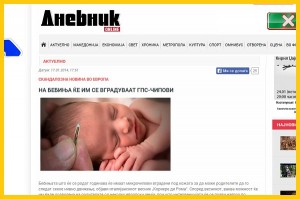Review: Babies will be implanted with GPS chips
Published in Reviews
on 26 - 01 - 2014 Author: Сашо Спасоски
Some journalists and editors have the odd need of constantly being in a state of making news out of every information, which is later widely read, viewed, heard, although oftentimes such information doesn’t have such potential. Most information is characterized by fake, seductive dazzle and most of the times, if the journalist is unable to resist it, and the editor cannot recognize it, such information becomes sensationalism.
The article, subject of our review, complies with the aforesaid: this news’ fake dazzle hasn’t been “recognized” as worth of publishing, therefore this article’s title and content have nothing to do with reality.
Yes, it should be said that the subject of implanting microchips containing personal data and GPS features is a hot topic worldwide, but the debate itself is still far, far away from the moment when this idea will be ready for implementation. Because of the technological and ethical issues, this idea might remain solely an idea. This, however, doesn’t impede the conspiracy theorists to smolder the rumor on microchips, but the journalists are the first ones who have to recognize that.
 Link to the original article: На бебиња ќе им се вградуваат ГПС-чипови
Link to the original article: На бебиња ќе им се вградуваат ГПС-чипови
Date and time of publishing: 17 January 2014, 5:51 PM
Date of review: 24 January 2014
Truthfulness: Regarding the truthfulness of this journalistic content, taking into account our introduction to this review, we are going to begin with the first article of the Code of Journalists, which reads:
The journalists have right to free access to all sources of information that are of public interest. The journalists shall publish correct, verified information and will not conceal essential information or forge documents. If given information cannot be confirmed or if it is a matter of assumption, i.e. speculation, which should be noted and published. Correctness of the information ought to be verified as much as possible.
The third paragraph is clear: “If given information cannot be confirmed or if it is a matter of assumption, i.e. speculation, which should be noted and published. Correctness of the information ought to be verified as much as possible.”
This information hasn’t been confirmed, and there is no note pointing out that it’s a matter of presumption i.e. speculation.
It’s an editorial error, which may prompt false conclusions and even false actions by the readers, and demonstrates professional unaccountability as well.
Sources of information: The “destiny” of this article should’ve started and ended at the sources of information. The author is referring to a totally unimportant Italian local newspaper, one from the “yellow press” list, which in the article titled Microchip obbligatorio per tutti i Neonati da Maggio 2014 (“As of May 2014, all newborn babies will be microchipped”) provides no arguments that all newborn babies will be microchipped as of May this year. The same media construction is published by our newspaper too.
Besides, both in the original and in the reviewed article, there isn’t a single relevant institution that can confirm that. Only some kind of ASL Association, with no explanation what’s it exactly, and some kind of Comitato Consultivo per il Controllo della Popolazione, which also lacks explanation on its existence, are mentioned.
The article we are reviewing contains a statement by a veterinarian???!!!??? But, let’s accept that there is a possibility of analogy regarding the implantation of chips in animals and humans, but how can somebody publish an article on something that could spark serious discussions in serious institutions around Europe, and in Macedonia for that matter.
They have found it interesting and – boom: “Babies will be microchipped”. As of May this year, to be exact.
Extensiveness: Besides the veterinarian’s comment, the article’s author had asked for a comment from a professor at the Faculty of Security Studies, who’s skeptical and emphasizes that it’s too early for even talking about such thing and if it’s about to be implemented in our country, then the Constitution will have to be amended. But it seems that this hadn’t been enough to deter the author from the idea of writing this article as early as after reading the story in the Italian newspaper.
In the name of the desired extensiveness, the article’s author mentions reactions of some religious communities, which believe that it is the realization of the biblical prophecy about “The Mark of the Beast”. That’s just partially true, because if the article was supposed to be all-embracing, then the readers should have been explained to that there are plenty of religious communities, such as the Russian Orthodox Community for example, which fosters a diametrically opposing opinion, and its members believe that the microchips are a superstition which:
“…doesn’t comply with the orthodox interpretation of Saint John the Theologian’s Book of Revelation, according to which “the mark of the beast” will be placed on those who shall intentionally believe in it “solely because of its false miracles” (Saint John Chrysostom).”
Hence, this article should have had such update included, which would have been completely appropriate to balance the thesis that confidently announces something, both in the title and throughout the text, without realistic grounds. Especially not as of May this year.
Quality of the title: The title is sensationalistic and not unjustifiably worrisome, owing to the fact that it contains no arguments, same as we confirmed about the truthfulness, which confirm that the microchipping will be an actual reality.
Conclusion: Let’s conclude by referring to yet another recommendation by the Pew Research Centre for Excellence in Journalism, published in the “Manual on ethics in journalism” (T. Chausidis and Z. Bojarovski, AJM [Association of Journalists of Macedonia], 2012), which says:
“Journalists rely on one of the most substantial actions in their work – verification, i.e. information check. When the concept of objectivity appeared, it didn’t mean that the journalists are deprived from prejudices. However, objectivity and balance are indispensable in order not to put the accuracy of information in question due to cultural and personal prejudices of journalists.”
Hence, the journalist can have prejudices, but if he/she is wise and sensible enough, he/she will find the objectivity in the methodology. The search for as many eyewitnesses as possible, as many appropriate sources as possible, opening multiple possibilities for opinions, are actions that demonstrate the standards of objective journalism that always verifies information.
These instruments of verification and check separate journalism from the other means of communication, such as the propaganda, fiction or entertainment.
This review was created within the framework of the USAID Media Strengthening in Macedonia Project - Media Fact-Checking Service Component,, mplemented by Metamorphosis. The review is made possible by the generous support of the American people through the United States Agency for International Development (USAID). The contents are the responsibility of its author and do not necessarily reflect the views of Metamorphosis, USAID or the United States Government. For more information on the work of USAID in Macedonia please visit its website (http://macedonia.usaid.gov) and Facebook page (www.facebook.com/USAIDMacedonia).
INFOGRAPHIC
 TRUTHFULNESS
TRUTHFULNESS
has facts
the accuracy of allegations cannot be determined
trustworthiness of allegations cannot be determined
 SOURCES OF INFORMATION
SOURCES OF INFORMATION
sources are presented
unofficial
irrelevant
more sources
unbiased
 EXTENSIVENESS
EXTENSIVENESS
non-extensive
concealed information
 BIAS
BIAS
partially presenting the truth
spinning the truth
has false information
не аплиактивно
 COMMENTING
COMMENTING
comments not included
 PLAGIARISM
PLAGIARISM
original work
author is attributed
 TITLE QUALITY
TITLE QUALITY
non-informative
non-creative
sensationalistic
inappropriate
tendentious
 PHOTOGRAPH
PHOTOGRAPH
has a photograph
appropriate
neither manipulating nor informing - serves as an illustration
author (source) is not attributed
 HATE SPEECH
HATE SPEECH
no offensive speech
no hate speech
doesn't encourage violence
no discrimination
 EDITED FOR THE WEB
EDITED FOR THE WEB
readable
quality multimedia elements
has contextual links
somewhat orderly
not connected with tags

